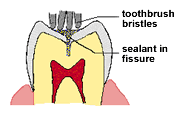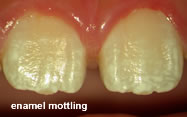Children's Oral Health: Frequently Asked Questions (FAQ)

- How do I clean my babies teeth?
- When and how should I introduce the toothbrush?
- What is nursing bottle caries?
- When should a child start seeing the dentist?
- How do I prepare the child for the first dental visit?
- What can I do to prevent cavities?
- When should I introduce toothpaste?
- Will thumb sucking cause crooked front teeth?
- How do I stop thumb sucking?
- How often should my child's teeth be checked?
How do I clean my babies teeth?
Use a cloth to wipe your baby’s teeth once they have emerged — tooth eruption usually starts with the lower central incisors at about 6 months of age. Include cleaning the teeth in your routine as you clean your child each morning and before bed every night.
If he or she attempts to bite you while you clean their teeth, insert a finger from your other hand between the gum pads behind. This will prevent the teeth in front from coming together.
When and how should I introduce the toothbrush?
Children naturally like to mimic adults. Brush your teeth in front of your children to show them it is part of your daily personal hygiene routine. Soon, they will naturally ask for a toothbrush to mimic you.
Provide your child with a small head brush with soft bristles to enable them to join you. It does not really matter that they lack the dexterity to brush their teeth, but it allows your child to play with the brush and gets him/her used to having it in the mouth. When your child is used to it, he/she will usually allow you to brush for them without any fuss.
The next stage is when they think they are sufficiently dexterous not to want your help. However, generally children are not sufficiently dexterous to brush their teeth thoroughly till they are about 12 years old, and will still require your supervision and checking! Check the grooves on the surface of the posterior teeth as deposits tend to accumulate in them, and they are common sites for cavities to start.
What is nursing bottle caries?
Teeth are most prone to decay when they first emerge. Babies fed sugar containing drinks before sleeping usually develop a whole mouthful of cavities, known as “nursing bottle caries."
Do not feed with sugar containing drinks or add sugar to milk, as this promotes dental caries.
When should a child start seeing the dentist?
Recent guidelines recommend that the child see a dentists after eruption of the first tooth, which is generally between 6-12 months of age. This is because some children develop nursing bottle caries. However, where caregivers provide the child with a sugar-free diet and good oral hygiene, when the child is around 2½ years of age, when all the twenty milk (baby) teeth have emerged, they tend to be more co-operative.
Children who have their first dental appointment when they are young are more likely to have a favourable outlook toward dental care throughout their life. When a child is correctly prepared for their first visit, it should not be a problem.
Children nursed on sweetened drinks may develop cavities even before this. Correct nutritional and oral hygiene habits are important to prevent caries in young children.
How do I prepare the child for the first dental visit?
Fear of dental treatment is not instinctive! It is often learnt. The most important persons in preparing the child for the first dental visit are usually the parents, as any anxiety is transmitted to the child. Some tips for preparing your child for their first dental check-up are:
- Familiarize the young child with the dental office. Take the child along when someone else in the family goes for their routine dental check up.
- Explain to the child what will be done at the first visit. This first visit involves an examination. Depending on the age and co-operation, the teeth may be polished.
- Do not communicate your own fears and anxiety to the child.
- Do not threaten the child with a visit to the dentist or that you will ask the dentist to pull out the child’s tooth as a punishment when the child misbehaves. This will give the child the impression that the dentist is a villain! We're actually saints!
What can I do to prevent cavities?
Tooth Brushing. The best method for preventing cavities is to thoroughly remove dental plaque and food deposits by thorough tooth brushing.
Diet. Children generally have a sweet tooth. This is potentially harmful only if your child's teeth are not properly cleaned. Totally eliminating sweets and chocolates from your child's diet is usually impractical. If your child must have chocolates or sweets, it is less likely to be harmful if eaten immediately after meals rather as between meal snacks.
We sometimes find care-givers tend to reward or bribe children with sweets to reinforce or obtain positive behaviour traits. This reward system is used very successfully to train animals and birds to perform at shows in the zoo and bird park - but not with cariogenic sweets. If you cannot find alternatives, use sugar-free sweets.
Fluoride hardens teeth, and is present in Singapore’s public water system since 1956. The current fluoride level in our water is between 0.4-0.6 parts per million. Water fluoridation can reduce the incidence of dental caries. Fluoride is also present in almost all toothpastes. Your dentists may also apply fluoride to your child's permanent teeth as they erupt to make them more resistant to cavities.
Your child may not be getting the benefit of water fluoridation if fed exclusively on bottled water, or if you live in a non-water fluoridated area. Fluoride tablets or drops can be taken instead.
Fissure Sealants. Dental caries usually begins in the fissures (grooves) on the biting surfaces of the teeth. This is where germs and sticky sweet foods most easily accumulate. If these grooves are deep and narrow, even the toothbrush bristles cannot get in to clean it, and a cavity may develop.

The majority of molars that develop cavities, do so within one year of eruption. To prevent dental caries from forming in these susceptible areas, a plastic material , known as a fissure sealant, is flowed into these grooves, thus sealing them. This also makes it easier to keep clean. Fissure sealant application does not usually require any drilling.
Fissure sealant application reduces the the incidence of cavities in sealed teeth by 57% after 4 years*! It is therefore recommended that these sealants be placed in teeth judged to be at risk of developing dental caries or where caries has initiated but has not formed a cavity yet, to limit its progression.
* Ahovuo-Saloranta et al. Pit and fissure sealants for preventing dental decay in the permanent teeth of children and adolescents. Cochrane Database Syst Rev. 2008 Oct 8;(4):CD001830.
When should I introduce toothpaste?
Children's toothpaste are mostly fruit-flavored and also fluoridated. If you use this type of toothpaste, only introduce toothpaste when your child can rinse out well and can understand that he/she should not swallow the delicious toothpaste! Otherwise, use a non-fluoridated toothpaste till they are older.

Use a smear of toothpaste only. Toothpaste is highly fluoridated for its beneficial topical effect for making teeth less prone to cavities.
In young children, accumulated amounts of fluoride from regularly swallowing toothpaste may affect the child's permanent teeth which at this age are still developing in the jaw. When the permanent tooth emerges, it may have white patches, termed enamel mottling (see photo left).
Will thumb sucking cause crooked front teeth?
Passive, occasional thumb sucking in babies and young children is normal. It is only damaging when it persists as the permanent front teeth emerge. The guiding action of the thumb, together with the active lip action of sucking, particularly if vigorous, causes the lower front teeth to tilt inwards and the upper front teeth outwards to accommodate the thumb. This is do-it-yourself orthodontics!
It is therefore important that your child stops thumb (or finger) sucking before the eruption of their permanent front teeth, which usually occurs at about 6 years.
How do I stop thumb sucking?
This is often easier described then it is to achieve for the avid thumb sucker! Most children respond to reasoning, and if they know why they need to stop and are motivated, it becomes easier. Each child is different and you can try some of the following ways which you think will be supportive to your child's efforts:
- Placing a plaster or bandage around the thumb.
- Painting the thumb with a bitter solution (available from pharmacies).
- Custom made anti-thumb sucking dental appliance.
How often should my child's teeth be checked?
Your child should have their teeth checked every 6 months. This enables the dentist to check for cavities, assess the development of your child's permanent teeth, and reinforce the parent's instruction on the need to keep the teeth clean. The dentist will also be able to recommend any preventive measures necessary to prevent future dental problems.
🔝

